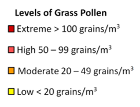The Adelaide Pollen Count to get underway
The Asthma Australia Adelaide Pollen Count will start reporting on daily grass pollen and other pollens in the air from September 14th, to help support those who suffer from seasonal allergies and asthma.
The partnership between Asthma Australia, the University of Adelaide and the AusPollen Aeorbiology Collaboration Network headed up by the Queensland University of Technology will give people in Adelaide a report on the past 24hrs each day at asthma.org.au/pollen-monitoring/
The Asthma Australia Adelaide Pollen Count is proudly supported by the South Australian Power Networks and without their contribution, there would be no pollen count this year as this service is yet to be funded by state or local government.
The pollen count is always a popular resource for Adelaide residents. Most people affected by asthma (13% in South Australia) are also affected by hay fever, helping to make up the one in five of us who get seasonal allergies.
People are encouraged to check it regularly to monitor when pollen levels are peaking and to adjust plans if their health could be impacted.
People whose asthma and hay fever are triggered by pollen can respond using the following guide but should always aim to avoid exposure on high and extreme pollen days:


Low: Continue as planned with normal asthma and hay fever preventative action.
Medium: Be cautious, avoid exposure where possible; always keep asthma reliever medication with you; ensure you are treating hay fever symptoms.
High: Be on alert: avoid exposure wherever possible and outdoor exercise; consider changing plans if they involve being outdoors; always keep asthma reliever medication with you; ensure you are treating hay fever symptoms. Close windows in the car and doors and windows at home to reduce pollen exposure.
Extreme: Be vigilant: avoid exposure by staying indoors with windows and doors closed; avoid outdoor exercise; ensure you’re treating hay fever symptoms; turn air conditioning to recycle air, if available; always keep asthma reliever medication with you; follow your asthma action plan; call triple zero in case of an emergency.
If you experience symptoms of cough, tight chest or wheeze during the grass pollen season you should put your asthma management plan into action and seek medical help if needed.
For more information about managing spring allergies and asthma, click here.






